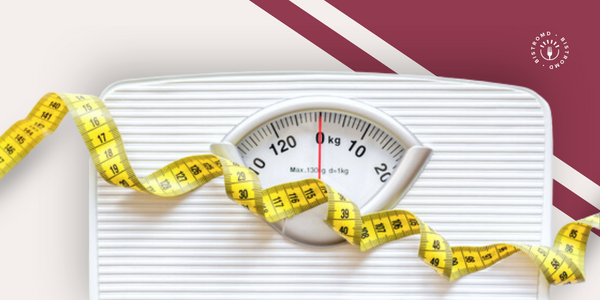
Even though you may wonder, "What is yo-yo dieting?" you're likely already familiar with it.
Like a yo-yo, weight cycling occurs when weight goes up and down repeatedly. This pattern often involves fad diets and trends and can be particularly dangerous when it comes to long-term health and well-being.
Keep reading to learn more about yo-yo dieting and escaping the cycle if you're currently in it.
What Is Yo-Yo Dieting?
Yo-yo dieting, also referred to as weight cycling, happens when there are repeated attempts at weight loss followed by periods of weight regain.
The weight gain is often unintentional but prompts intentional periods of weight loss, followed by more unintentional weight gain (and so on). Many experts consider weight cycling a chronic condition since the majority of dieters struggle to maintain weight loss in the long run.
This type of dieting usually proceeds in the following stages, with the relapse stage playing a significant role for weight-cyclers in the return to pre-change behavior. Think of this pattern as a cycle rather than a list, where relapse eventually leads back to pre-contemplation, and the cycle begins all over again:
• Pre-contemplation: Not considering or unaware of change
• Contemplation: Considering change
• Decision: Deciding to make a change
• Action: Engaging in behaviors to make the change
•Maintenance: Change adopted and habits formed
•Relapse: Return to pre-change behavior
The challenge? Yo-yo dieting often involves physical, emotional, and mental health factors. It can involve intense or increased dieting and physical activity or may just involve dieting. The roots of weight cycling may even stretch back into childhood or adolescence.
The opportunity? The cycle can be broken by focusing on, or staying in, the maintenance phase. This is where meaningful change can be adopted, healthier habits can be introduced, and weight loss can turn into healthy weight maintenance.
Who Is Susceptible to Yo-Yo Dieting?
A particularly scary aspect of yo-yo dieting is that it doesn’t seem to discriminate by age or weight category. In other words, it’s not just an issue for obese or overweight individuals but can also affect many “normal” weight people. It can even be a problem for underweight individuals who still feel pressure to lose weight.
Additionally, weight cycling can affect vulnerable populations, such as children, teens, and the elderly. During these phases of life, it’s normal for weight to fluctuate. However, pressures from media, parents, friends, family, and society can cause weight cycling and body image issues to begin as early as age 6 and last into the later years of life.
Another particularly susceptible population is athletes, especially those in weight-sensitive or performative sports or activities that rely on an aesthetic standard. Athletes are extra vulnerable to weight cycling between seasons (during the off-season) since they may feel pressure to maintain their body’s “personal best” even though their day-to-day doesn’t involve nearly as much training or exercise.
Also, since many sports start young, children and adolescent athletes are highly susceptible to this dangerous cycle.
Consequences of Yo-Yo Dieting
While dieting may seem harmless at first, some sources say it’s a severe public health issue. Here are a few reasons why health experts discourage yo-yo dieting.
Predisposition to Gain Weight
Interestingly, dieting is considered a predictor of future weight gain, particularly among young dieters. Studies suggest that repeated cycles of weight loss and regain may predispose you to weight gain since your body adapts to a lower level of food intake and then struggles to adapt to a higher amount.
One specific type of weight gain associated with yo-yo dieting is abdominal obesity, or gaining extra weight around the waist. Weight gain in this specific body region is tied to many health risks.
Hard on Your Heart
Speaking of health risks, body weight fluctuations are associated with many health conditions, many about the cardiovascular system. Essentially, constantly fluctuating weight can put pressure on the heart and blood vessels that supply it, and may lead to chronic inflammation.
Ultimately, weight cycling is associated with a higher risk of coronary heart disease and a higher rate of cardiovascular events. Yo-Yo dieting may also raise the risk of developing metabolic diseases, such as type 2 diabetes.
Weight fluctuations can also result in fluctuating markers related to heart health, such as blood pressure or blood sugar. This can make staying within a “healthy” range challenging, especially during weight regain periods. Research also suggests weight cycling can go out of whack through healthy markers, such as “good” (HDL) cholesterol.
Loss of Lean Body Mass
Along with losing body fat during periods of intentional weight loss, you may unintentionally lose lean body mass. In other words, you may lose muscle while losing fat.
Muscle loss can be especially dangerous for older adults since maintaining lean body mass may help prevent falls and fractures and promote independence. In older dieters, yo-yo dieting may lead to a condition called sarcopenic obesity, where the body has a high-fat mass but low muscle mass.
Ultimately, such changes in body composition can lead to disability or physical limitation and is likely to increase the risk of heart and metabolic diseases as well.
An Unhealthy Mindset
Weight cycling can also be harmful to mental health and be linked to conditions like eating disorders or body dysmorphia. Yo-yo dieting is often engaged in as a form of weight loss and can be associated with severe caloric restriction or disordered eating behaviors.
During periods of weight gain, some individuals may even engage in “binge then purge” behaviors.
How to Break the Yo-Yo Dieting Cycle
Maybe you were taught that yo-yo dieting was expected, or maybe it was a behavior you adopted in adulthood. Either way, the good news is that you can ditch this unhealthy form of dieting! It’s important to remember that baby steps are still progress and that small yet significant shifts in mindset can make a big difference over time.
Studies show that avoiding weight cycling, especially during the first year after a healthy weight loss, seems to be a sustainable strategy for long-term success (weight maintenance). In other words, there is power in engaging in healthy habits; if you keep them up for 12 months, you’re more likely to keep them up in the long run.
Want to escape the cycle but don’t know where to start? Try these steps to improve your mindset and health for the long haul.
Acknowledgment, Awareness & Accountability
Although cliche, the saying “the first step to solving any problem is to admit you have one” holds some truth. You’ve likely taken the first step just by reading this article! Understanding the risks of weight cycling can help you contemplate and implement change, ultimately leading to healthier habits.
Instead of beating yourself up about “bad habits,” acknowledge them. By taking accountability, you’ll likely be able to move on more quickly. Replacing a bad habit with a good one can help hasten the improvement process.
Ask For Help
Remember, you aren’t alone in your efforts to implement better habits. Working with a dietitian can help, especially in more severe cases where disordered eating has come into play. Dietitians, along with a well-rounded healthcare team, can help you find solutions to everyday eating problems by removing barriers to a healthy eating pattern.
Your healthcare team can assist you in developing a specific program with clear steps to recovery. Remember, this may necessitate adding a mental health expert to your team. Therapists can assist you in identifying harmful behaviors, past traumas, and areas for improvement.
Rely on Routine
It may sound too simple, but a steady routine can make all the difference! Especially when it comes to healthy eating and exercise, a regular (but not too rigid) routine may make you more likely to complete health-promoting tasks, like a workout.
Setting up a schedule with some room for flexibility can help promote a sense of confidence, as opposed to the feeling of failure (which may prompt a relapse in weight cycling). With a regular schedule, you can trust that even if you didn’t workout or eat healthy today, there’s a space in your routine to return to healthy behaviors tomorrow. A good routine encourages you to plan actions that help sustain a meaningful change.
Clue Into Cues
If you don’t feel like a natural “scheduler,” consider that your body has been one from the start! Signals like hunger and thirst prompt you to eat or drink at specific points of the day. Weight cycling may cause you to ignore these signals, quitting your body’s natural rhythm.
Ditching dieting invites you to listen again to your body’s natural cues. This style or approach to eating is often referred to as intuitive eating, because it involves responding to your body’s innate instincts rather than letting strict diet “rules” govern your intake. Manu individuals find that while embracing this approach, they naturally crave healthy foods and activities (like a salad or a walk).
A healthier eating approach and a positive food environment can be encouraging, and many activities can fall into this category. As a parent, this may mean modeling a healthier relationship with food for your kids. For teens, this could mean posting affirmations in the mirror when you’re feeling vulnerable.
The environmental cues around you can make a difference in how you feel and think about your body (and, ultimately, yourself).
Choose Exercise You Actually Enjoy
For many yo-yo dieters, an obsession with exercising exists. When switching to a more balanced way of living, try choosing a form of exercise you genuinely enjoy, not just the type of exercise promoted for weight loss. For example, try rollerblading, group classes, or yoga if that’s what interests you. Consider non-exercise forms of movement, too, like gardening.
Navigate Success Using Non-Scale Victories
When you stop weight cycling, you may initially feel lost without the bathroom scale indicating your weight loss progress. Luckily, there are plenty of ways to measure success without stepping on the scale, called non-scale victories.
These “wins,” like feeling more energy or less anxiety, are meaningful ways to document daily progress. They may even be better indicators of the positive changes you're making than the scale since body weight notoriously and naturally fluctuates throughout the day due to various factors. Focus on habits instead of weight may naturally lead to healthy weight adjustments.
Patience & Resilience
A final word of advice? Be patient. (Easier said than done, right?) Even though social media may have you believing otherwise, nobody’s perfect (and nobody’s body is perfect). There may be periods, like postpartum, where “bouncing back” may not be healthy or in your best interest.
When times get rough, it may be helpful to remember that truly healthy habits take time, and so do their results. As mentioned above, it may take months, or even a year or more, to achieve a healthy mindset. However, the hard work is worth it for your physical and mental health, especially in the long run.
Another productive thought to remember is that the yo-yo dieting mindset took years to develop, so it may take years to unlearn. Instead of being hard on yourself, take a step back and recognize how far you’ve come and the daily successes catapulting you into a healthier life.
Weight Cycling and Yo-Yo Dieting: Final Bites
In an environment that values thinness and pressures you to avoid weight gain at all costs, it’s easy to fall into the yo-yo dieting trap. Stopping weight cycling may even feel revolutionary in today’s society and can undoubtedly revolutionize your routine and how you feel about yourself.
Remember, ditching harmful dieting practices isn’t something you must do alone. Dietitians, therapists, and other helpful healthcare professionals can assist you all along the way—from recognizing you’re dealing with a problem to implementing and maintaining healthy habits and solutions.







